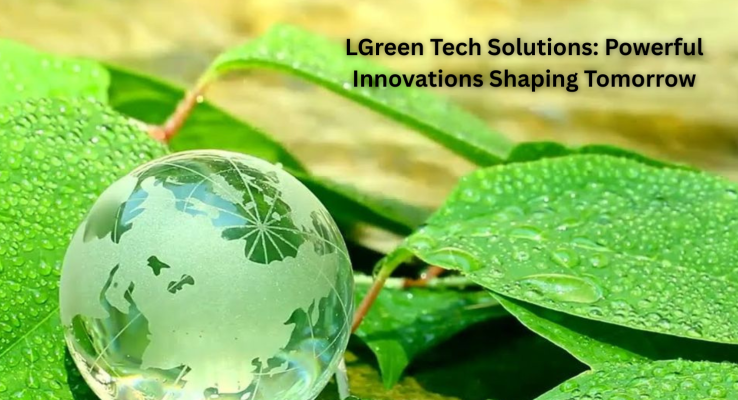
The world is at a turning point. Climate change, resource scarcity, and environmental challenges are forcing industries to rethink how they operate. At My Urban Business, we believe that the future belongs to companies that embrace green tech solutions — innovative, sustainable technologies that protect the planet while driving economic growth. From renewable energy breakthroughs to smart manufacturing, green tech solutions are transforming industries, creating new jobs, and ensuring a cleaner, healthier future for generations to comedian this comprehensive guide, we’ll explore the most powerful innovations shaping tomorrow, how they work, and why they matter for businesses, communities, and the planet.
What Are Green Tech Solutions?
Green tech solutions (or green technology) refer to products, systems, and processes that use environmentally friendly methods to reduce pollution, conserve resources, and improve sustainability.
This includes:
- Renewable energy systems like solar, wind, and hydro.
- Energy-efficient building designs.
- Sustainable manufacturing and supply chains.
- Waste reduction and recycling innovations.
- Clean transportation solutions.
Why Green Tech Solutions Matter Now
We’re at a critical moment in history. Global energy demand is rising, but so is the urgency to reduce greenhouse gas emissions. Businesses that invest in green tech solutions can:
- Lower operational costs.
- Meet environmental regulations.
- Attract eco-conscious consumers.
- Gain a competitive edge in emerging green markets.
Renewable Energy Breakthroughs
Renewable energy is the foundation of green tech solutions. New innovations are making clean energy more efficient, affordable, and accessible than ever.
Solar Power Advancements
Modern solar panels are more efficient, durable, and cost-effective. Flexible solar sheets now allow for integration into rooftops, vehicles, and even clothing.
Offshore Wind Farms
Floating wind turbines can harness wind energy in deeper waters, expanding clean energy potential.
Example:
Countries like Denmark and the UK are investing heavily in offshore wind to power millions of homes.
Energy Storage Innovations
One of the biggest challenges in renewable energy is storage. Green tech solutions are delivering smarter, longer-lasting batteries.
Next-Gen Batteries
Solid-state batteries offer higher capacity, faster charging, and longer lifespans compared to lithium-ion.
Grid-Scale Storage
Massive energy storage systems allow excess renewable energy to be stored for use during peak demand.
Smart Grids and Energy Management
Efficient distribution of electricity is key to sustainability.
AI-Powered Energy Distribution
Smart grids use AI to balance supply and demand, reducing energy waste.
Consumer Energy Tracking
Homeowners can monitor energy use in real-time through apps, encouraging more responsible consumption.
Sustainable Manufacturing
Industrial operations are going green with eco-friendly manufacturing processes.
Circular Economy Practices
Products are designed for reuse, recycling, and minimal waste.
Low-Emission Production
Factories adopt renewable-powered systems and carbon capture technology.
Green Building Technologies
The construction sector is one of the largest contributors to carbon emissions — but it’s also a leader in adopting green tech solutions.
Energy-Efficient Designs
Buildings now feature passive cooling, natural lighting, and green rooftops.
Smart Sensors
IoT-enabled sensors optimize lighting, heating, and cooling based on occupancy.
Clean Transportation
Transportation accounts for nearly a quarter of global CO₂ emissions. Innovations here are game-changing.
Electric and Hydrogen Vehicles
EVs are becoming more affordable, and hydrogen-powered vehicles offer zero emissions for heavy-duty transport.
Sustainable Public Transit
Electric buses, bike-sharing programs, and high-speed rail systems are reducing urban pollution.
Waste Management and Recycling Innovations
Reducing waste is at the heart of sustainable development.
Advanced Recycling Technologies
Chemical recycling breaks down plastics into reusable raw materials.
Smart Waste Systems
AI-powered waste sorting improves recycling rates and reduces landfill use.
Water Conservation Technologies
Water scarcity is a growing issue — and green tech solutions are stepping up.
Smart Irrigation
Sensors deliver precise amounts of water to crops, reducing waste.
Desalination Innovations
New systems turn seawater into drinking water with minimal energy use.
Carbon Capture and Storage (CCS)
CCS technologies capture carbon emissions before they enter the atmosphere, storing them underground or repurposing them in products.
Example:
Some companies are turning captured CO₂ into building materials like concrete.
AI and Big Data for Sustainability
Artificial intelligence and data analytics are helping track, predict, and optimize environmental performance.
Predictive Maintenance
AI detects equipment issues before breakdowns, reducing waste and energy use.
Environmental Monitoring
Big data helps governments and companies track pollution and implement rapid responses.
How Businesses Can Adopt Green Tech Solutions
Audit your environmental impact. Identify where energy, water, and resources are being wasted.
Invest in renewable energy systems. Solar panels, wind turbines, or purchase green power from suppliers.
Upgrade to energy-efficient equipment. Replace outdated systems with eco-friendly alternatives.
Implement waste reduction programs. Encourage recycling, reuse, and circular design principles.
Educate and engage employees. Make sustainability part of the company culture.
The Economic Benefits of Going Green
Many companies worry that green technology is expensive, but the long-term benefits far outweigh the initial costs:
- Lower utility bills.
- Increased brand reputation.
- Access to government incentives.
- New revenue from eco-conscious customers.
FAQs
What are the most impactful green tech solutions today?
Renewable energy systems, electric vehicles, and energy-efficient buildings are currently leading the way.
How do green tech solutions help businesses save money?
They reduce energy bills, lower maintenance costs, and open access to eco-conscious markets.
Are green tech solutions only for large corporations?
No, small and medium businesses can also adopt cost-effective green technologies.
How does AI contribute to green technology?
AI optimizes energy use, predicts maintenance needs, and monitors environmental impact.
What is the future of green tech solutions?
Expect rapid advancements in battery storage, carbon capture, and AI-driven environmental management.
Conclusion:
At My Urban Business, we believe that green tech solutions aren’t just a trend — they are the future. By embracing powerful innovations in renewable energy, sustainable manufacturing, clean transportation, and smart infrastructure, we can build a world that thrives economically without harming the planet.The time to act is now. Every investment in sustainability is an investment in a healthier, more prosperous tomorrow.
